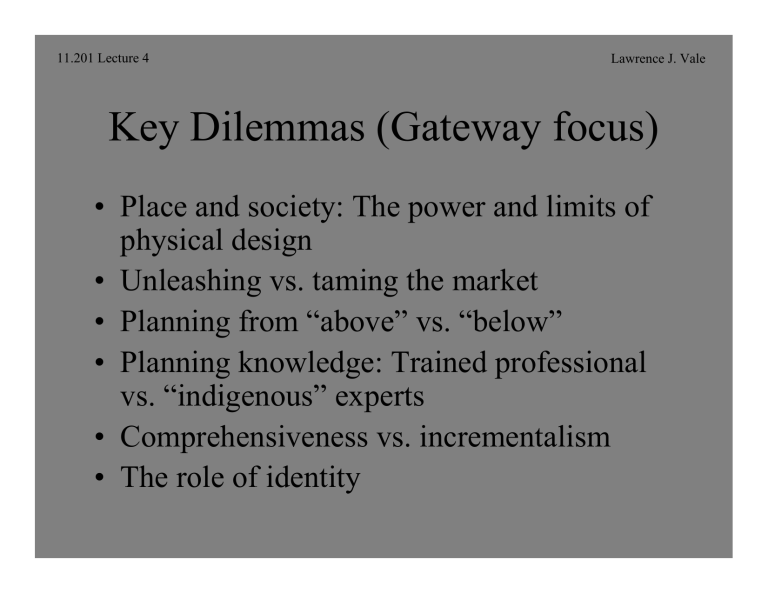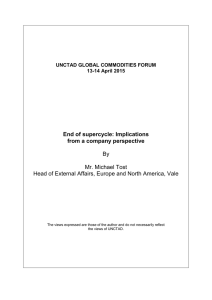Key Dilemmas (Gateway focus)

11.201 Lecture 4 Lawrence J. Vale
Key Dilemmas (Gateway focus)
• Place and society: The power and limits of physical design
• Unleashing vs. taming the market
• Planning from “above” vs. “below”
• Planning knowledge: Trained professional vs. “indigenous” experts
• Comprehensiveness vs. incrementalism
• The role of identity
11.201 Lecture 4 Lawrence J. Vale
Power and limits of physical design
• Physical design as a tool for enhancing well-being
• Can it also enhance equity , i.e. address inequities?
• What “social needs” are uniquely addressed by design interventions?
• How to address a diversity of users/publics?
• Culture and values: What’s culturally determined? How are meanings attached to space? What does design assume about
“community”?
11.201 Lecture 4 Lawrence J. Vale
Trained vs. indigenous experts
• What forms of knowledge are valid ? Who sets the rules?
• What does public participation add to what technical experts provide?
• How can distinct types of expertise be blended to create better, not just more popular, solutions?
• Technocratic modernism vs. “deliberative democracy”
Planning traditions
KNOWLEDGE TO Conservative Radical
ACTION
In SOCIETAL
GUIDANCE
Policy analysis Social reform
In SOCIAL
TRANSFORMATION
Social learning Social mobilization
Boston: Developing and
Redeveloping Public Housing
• Focus is mostly on 2 of the “6 Key
Dilemmas”:
1. Trained vs. Indigenous Expertise
2. Power and Limits of Physical Design
Overview of Presentation
• 1. Public Housing Pre-history and History-the cultural challenges of planning action on low-income housing in the United States.
• 2. The Evolution of the Boston Housing
Authority as an institution.
• 3. A City of Three Tales--a comparison of public housing redevelopment in 3 Boston neighborhoods.
For Further Information, Reference:
• Vale, Lawrence J. From the Puritans to the
Projects: Public Housing and Public Neighbors .
Cambridge, MA: Harvard University Press, 2000.
ISBN: 0674002865.
• Vale, Lawrence J. Reclaiming Public Housing: A
Half Century of Struggle in Three Public
Neighborhoods . Cambridge, MA: Harvard
University Press, 2002. ISBN: 0674008987.
The Struggle to Build
Public Housing
(a pre-history)
Government housing assistance:
Reward? or Coping Mechanism?
11.201 Lecture 4 Lawrence J. Vale
Images of Homeownership, 1922
Small Homesteads for the
Worthy Working Poor
Large Institutions for Housing the Non-Worthy Poor
House of Industry and House of Correction, South
Boston, ca. 1825.
Depiction of the classes showing the working poor higher than poor mothers, higher than the poor who have succumbed to vice.
The Boston Housing Authority
• The Power and Limits of Social Reform and
Environmental Determinism
• Evolution of a Troubled Institution: From
High Hopes … to
Collapse/Receivership…to
Partial Recovery
• Early Public Housing:
Optimism
Open-ness
Opportunity
Taking Collective Action to
Redevelop Public Housing:
Why did 1 City have 3 Outcomes?
• West Broadway (“D Street”), South Boston
• Franklin Field, Dorchester
• Commonwealth (“Fidelis Way”), Brighton
3 Projects, 3 Contexts
Commonwealth:
Struggled to preserve integrated housing in a less integrated area.
West Broadway:
Predominantly white, struggled with re-integration.
Franklin Field
Struggled with disinvestment and lack of political clout.
BHA: A New Public Mission
• “The Authority recognizes that not only its statutory responsibility but also its moral, public responsibility to accommodate lowincome families in need of housing limit its freedom to reject the potentially unacceptable tenant.”
– BHA Statement, 1965
BHA, 1965 Mission
• “Families whose standards make them unacceptable are a responsibility of the community and, so far as their need for lowrent housing is concerned, of the
Authority.”
West Broadway Environs, 1990s
West Broadway Redevelopment,
Finally completed, 2005
Franklin Field Environs, 1990s
Commonwealth Environs, 1990s
Revitalization by Design
What to do?
Raze all public housing?
What to do?
Rebuild Housing/Replace
Tenants
•Who should benefit from redeveloped public housing?
11.201 Lecture 4 Lawrence J. Vale
For Next Time…
• Read Friedmann “Planning as Social Reform”
(Chapter 3)
• “Ask-the-Expert” session, joined by
Phil Thompson, local politics of housing policy
(NYC focus)
Xav Briggs, federal politics of housing policy (HUD focus)
Larry Vale, Q+A on Boston public housing as
“social reform”


